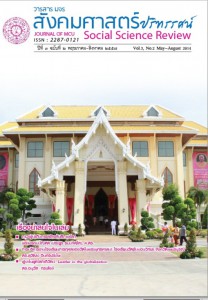การบริหารงานโรงเรียนการกุศลของวัดในพระพุทธศาสนา โรงเรียนวัดซับบอนวิทยา จังหวัดเพชรบูรณ์
บทคัดย่อ
โรงเรียนกับชุมชนต้องประกอบด้วยการมีส่วนร่วมของชุมชน ประสานงาน บ้าน วัด โรงเรียน คือ สามประสนร่วมกันในลักษณะกัลยาณมิต อยงยั่งยืนได้ พราะเกิดจากจิตใจที่ ต้องการเข้าร่วมในกิกรมใดกิจกรรมหนึ่ง เพื่อให้เกิดผลต่อความต้องการของกลุ่มคนที่สอดคล้อง
กับวิถีชีวิตทางสังคม ทั้งนี้ ในการที่จะให้ชุมชนข้ามามีส่วนร่วมอย่างแท้จริงนั้น การจัดกิจกรรม เพื่อ การมีส่วนร่วม ต้องคำนึงถึวิถีการดำเนินชีวิต คำนิยม ประพณี ทัศนคติของบุคคล เพื่อให้เกิดความ สมัครใจเข้าร่วมกิจกรม เพราะกลุ่มคนในชุมชน มีความแตกต่างกันใน ลักษณะส่วนบุคคล ลักษณะทางเศรษฐกิ และการได้รับข้อมูลข่วสาร ทั้งนี้ การเข้ามามีส่วนร่วมของชุมชน ควรมีการวิเคราะห์ สังเคราะห์ปัญหาของชุมช มีการวาแผนที่เหมาะสมและสอดคล้องกับวิถีชีวิต กำหนดกิจกรรม การดาเนินกิกรม และการประเมินผลกิจกรรม จัดขั้นตอนของการเข้ามามีส่วนร่วม และให้
ความสำคัญโดยใช้ชุมช เป็นศูนย์กลาง โดยโรงเรียนหน่วยงานภาครัฐช่วยเหลือ ให้คำแนะนำหรืออำนวยความสะดวกอย่างต่อเนื่อง การบริหารโรงเรียนหรือสถานศึกษา เป็นกิจกรรมทางการศึกษาที่จะต้องทำเป็น กระบวนการ โดยกลุ่มบุคคลต่งๆ เพื่อให้บรรลุวัตถุประสค์ที่ตั้งไว้ นั่นก็คือการพัฒนาสมาชิกหรือผู้รับบริการทางการศึษา ให้เป็นผู้มีคุณภาพที่สังคมต้องการ และเป็นภารกิจที่สำคัญยิ่งของผู้บริหารสถานศึกษาที่จะต้องสามารถนาองค์กรให้อยู่รอด ต้องกำหนดแผนงานวิธีการ ตลอดจนขั้นตอนต่างๆ
ในการปฏิบัติงนไว้อย่างมีระบบ โดยพึ่งพิงงบประมาณจากรัฐที่มีไม่มากนักด้วยความประหยัด ใช้ทรัพยากรให้คุ้มคำ ทั้งคน งิ เวลาและทรัพย์สินอย่างอื่นพราะถ้ระบบบริหารภายในสถานศึกษาไม่ดี จะกระทบกระเทือนต่ส่วนอื่นๆ ของหน่วยงานได้ ดังนั้นความสำเร็จหรือความลัมเหลวในการ
บริหารสถานศึกษา จึงขึ้นอยู่กับสมรรถภาพของผู้บริหารสถานศึกษาเป็นสำคัญโรงเรียนการกุศลของวัดชับบอนวิทยา จังหวัดเพชรบูรณ์ จัดว่าเป็นทางเลือกอีกทางหนึ่ง ซึ่งได้รับอนุญาตให้จัดตั้งเป็นโรงเรียนตามพระราชบัญญัติโรงเรียนเอกชน พุทธศักราช ๒๔๘๘
ซึ่งได้จัดการเรียนการสอนแบบเตียวกับโรงเรียนสามัญทั่วไป ขณะเดียวกันก็มีจุดเน้นที่ต้องการให้นักเรียนนั้นมีคุณธรรมจริยธรรม
โดยมีจุดประสงค์ มุ่งเสริมสร้งความรู้ความเข้าใจในหลักธรรม ซึ่งนำไปสู่การประพฤติ ปฏิบัติตามหลักธรมและคิกมหางพระพุทธศาสนา อย่างถูกต้องโดยการควบคุมกาย วาจา ใจ ให้อยู่ในกรอบคุณธรรมจริยธรรมและวัฒนธรรมอันตีงาม ไม่เบียดเบียนตนเองและบุคคลอื่น
สามารถสร้างปะโยชให้แตนเองและสังคม ตลอดจนมีลักษณะของความเป็นผู้นำและผู้ตามที่ดี เพื่อการดำรงตนเป็นพลมือที่ดีในสังคม ประชาธิปไตยที่มีพระมหากษัตริย์เป็นประมุข
เอกสารอ้างอิง
อุดม ชำณิ สนักงานกลุ่มโรงเรียนการกุศลของวัดในพระพุทธศาสนา. โรงเรียนพินิจ ประสาธน์ อำเภอเมือง จังหวัดพะเยา. ปราจีนบุรี : เจตนารมณ์รมณ์ภัณฑ์, ๒๕๕๓.
สำนักงานเลขาธิการคุรุภา. เกณฑ์มาตรฐานผู้บริหารสถานศึกษา. กรุงเทพมหานคร : โรงพิมพ์คุรุสภาลาดพร้าว, ๒๕๔๐.
สำนักงานคณะกรรมการการศึกษาเอกชน. การพัฒนาโรงเรียนการกุศลของวัดในพระพุทธศาสน.กรุงเทพมหานคร : สานักพิมพ์คุรุสภา, ๒๕๔๑.
สำนักงานคณะกรรมการการศึกษาแห่ชาติ. ความสำเร็จในการปฏิบัติภารกิจของวัดกรุงเทพมหานคร: โรงพิมพ์จุฬาลงกรณ์มหาวิทยาลัย, ๒๕๔๖.
พระไพศาล สุทธจิตโต (นทายะ) การบริหารงานโรงเรียนการกุศลของวัดในพระพุทธศาสนา จ้งหวัดราชบุรี. มหาวิทยาลัยมหาจุฬาลงกรณราชวิทยาลัย: ๒๕๕๔.
ดาวน์โหลด
เผยแพร่แล้ว
รูปแบบการอ้างอิง
ฉบับ
ประเภทบทความ
สัญญาอนุญาต
ลิขสิทธิ์ (c) 2018 วารสาร มจร สังคมศาสตร์ปริทรรศน์

อนุญาตภายใต้เงื่อนไข Creative Commons Attribution-NonCommercial-NoDerivatives 4.0 International License.
เพื่อให้เป็นไปตามกฎหมายลิขสิทธิ์ ผู้นิพนธ์ทุกท่านต้องลงลายมือชื่อในแบบฟอร์มใบมอบลิขสิทธิ์บทความให้แก่วารสารฯ พร้อมกับบทความต้นฉบับที่ได้แก้ไขครั้งสุดท้าย นอกจากนี้ ผู้นิพนธ์ทุกท่านต้องยืนยันว่าบทความต้นฉบับที่ส่งมาตีพิมพ์นั้น ได้ส่งมาตีพิมพ์เฉพาะในวารสาร มจร สังคมศาสตร์ปริทรรศน์ เพียงแห่งเดียวเท่านั้น หากมีการใช้ภาพหรือตารางหรือเนื้อหาอื่นๆ ของผู้นิพนธ์อื่นที่ปรากฏในสิ่งตีพิมพ์อื่นมาแล้ว ผู้นิพนธ์ต้องขออนุญาตเจ้าของลิขสิทธิ์ก่อน พร้อมทั้งแสดงหนังสือที่ได้รับการยินยอมต่อบรรณาธิการ ก่อนที่บทความจะได้รับการตีพิมพ์ หากไม่เป็นไปตามข้อกำหนดเบื้องต้น ทางวารสารจะถอดบทความของท่านออกโดยไม่มีข้อยกเว้นใดๆ ทั้งสิ้น





